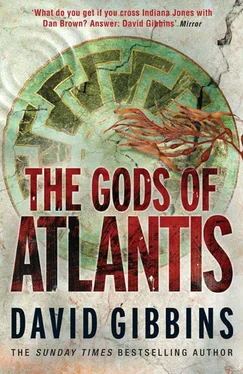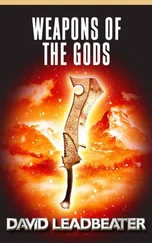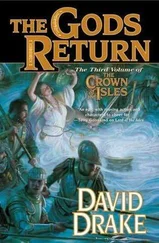David Gibbins - The Gods of Atlantis
Здесь есть возможность читать онлайн «David Gibbins - The Gods of Atlantis» весь текст электронной книги совершенно бесплатно (целиком полную версию без сокращений). В некоторых случаях можно слушать аудио, скачать через торрент в формате fb2 и присутствует краткое содержание. Жанр: Прочие приключения, на английском языке. Описание произведения, (предисловие) а так же отзывы посетителей доступны на портале библиотеки ЛибКат.
- Название:The Gods of Atlantis
- Автор:
- Жанр:
- Год:неизвестен
- ISBN:нет данных
- Рейтинг книги:3 / 5. Голосов: 1
-
Избранное:Добавить в избранное
- Отзывы:
-
Ваша оценка:
- 60
- 1
- 2
- 3
- 4
- 5
The Gods of Atlantis: краткое содержание, описание и аннотация
Предлагаем к чтению аннотацию, описание, краткое содержание или предисловие (зависит от того, что написал сам автор книги «The Gods of Atlantis»). Если вы не нашли необходимую информацию о книге — напишите в комментариях, мы постараемся отыскать её.
The Gods of Atlantis — читать онлайн бесплатно полную книгу (весь текст) целиком
Ниже представлен текст книги, разбитый по страницам. Система сохранения места последней прочитанной страницы, позволяет с удобством читать онлайн бесплатно книгу «The Gods of Atlantis», без необходимости каждый раз заново искать на чём Вы остановились. Поставьте закладку, и сможете в любой момент перейти на страницу, на которой закончили чтение.
Интервал:
Закладка:
Hoffman had inspected the markings on the crates when he first entered the room. They contained the treasures from ancient Troy given by Heinrich Schliemann to the people of Berlin more than sixty years before. Hoffman himself had seen them as a schoolboy, in the Museum of Pre- and Proto-History. Exactly why these crates should have remained here was unclear. But Hoffman knew Himmler personally, and he knew enough of Himmler’s psychology to guess at the reason. Himmler was obsessed with ancient artefacts, with mythical kings and heroes, with Ubermenschen – supposed races of supermen – and with those he identified as Aryan forebears, and above all with lost civilizations. Perhaps these artefacts had some kind of mystical power for him. Perhaps they were meant to stay in Berlin in her hour of greatest need. Hoffman shook his head derisively. The artefacts had not saved Troy, and they would not save Berlin. It was irrelevant now; within a day, the Zoo tower and those crates would be in Soviet hands. Meanwhile they served as good bench-ends to rest the planks of his desk against the incessant vibrations.
Hoffman realized that the flak guns had stopped firing, and he took his hands from his ears. Another sound was missing, the screech and rattle of the electric ammunition winch that brought shells up from the magazine. The generators must have failed yet again. The electricity had worked in fits and starts all night, and he had relied on candles for his writing. He watched the last one now, the flame still flickering and shuddering from the vibrations, barely casting enough light for him to read the open pages of his diary. Candles had served another purpose in the tower. Since the Soviet artillery had come within range, the thick metal shutters on the windows had been closed and the ventilation tubes sealed. Down below, the people crammed together in the stairwells used candles like underground miners to tell how much oxygen was left. When the candles on the floor went out, they lit them at waist level. When those went out, they held their children on their shoulders for as long as they could, hoping that someone above would take them. Already the bodies were piling up, and the hospital orderlies could no longer go outside to use the makeshift cemetery in the Tiergarten. The stench of decay was beginning to permeate the tower, along with the putrid odour from the hospital on the third floor above him, a charnel house where the wounded lay among piles of amputated limbs and shrouded corpses.
Hoffman closed his eyes, and rehearsed the plan he had devised with the flak-battery commander. At least he would not have to endure another night in this place, even if this day were to be his last. He glanced at his watch. Twenty minutes to go. At ten o’clock he would leave to find the battery commander. The evening before, two German soldiers captured by the Russians had arrived at the tower under a white flag with a peace offer from the commander of the Soviet division confronting them. The garrison commander had vacillated, terrified of the Feldgendarmerie, who had orders to shoot anyone who showed the slightest sign of surrendering, even the commanding officer. Hoffman and the battery commander had secretly decided to act on their own volition if the garrison commander still had not delivered his surrender to the Russians by this morning. They would muster men in the battery loyal to them, kill the Feldgendarmen and go out under a white flag. It was a desperate scheme, almost guaranteeing civilian deaths, but not on the scale there would be if no surrender were forthcoming. The Feldgendarmen knew they would be shown no mercy by the Russians, so would never surrender. Hoffman and the battery commander had decided to wait overnight for the garrison commander to change his mind, but the man had been intractable, shut in his room and probably drunk, and now the Feldgendarmen were preventing anyone from getting near him.
There were two guards outside Hoffman’s door now, there to ensure that he did his duty as well. He clenched his fists and took a deep breath, almost choking on the acrid air. His duty. He was the newly appointed commander of the 9th Luftwaffe Parachute Division Lebelstar. The division was a phantasm dreamed up by the drunkards and madmen in the Chancellery, another gloriously named spearhead unit that would save the Reich, another ragtag band of old men, boys, the walking wounded and shell-shocked veterans who had somehow survived the carnage on the Eastern Front to die in this theatre of the absurd. When Hoffman shut his eyes in this place he sometimes glimpsed stark images from the plays he had seen in Paris before the war, existentialist dramas by Beckett and Brecht that had so fascinated and disturbed him, on the border between theatre and reality. It was as if he had been seeing a premonition of his own final act, here where the stage setting also seemed surreal, on another level of consciousness, yet awash with real blood and real anguish and horror.
He undid the leather flap of the holster on his waist, took out his Luger, ejected the magazine and checked that it was full, then pushed the magazine in again and cocked the pistol, shoving it back in the holster but leaving the flap open. He thought for a moment, then snapped the flap shut. The Feldgendarmen must see no hint of his intentions. He felt for the two extra magazines in the pouch on his belt, then straightened his jacket and peaked cap, passing his hand over the Luftwaffe badges on his tunic and the Knight’s Cross at his neck. He prayed that he and the battery commander had got the timing right. All radio communication with the Chancellery had ceased the day before. There had been rumours that the Fuhrer had killed himself, and then a Chancellery secretary who had fled across the Tiergarten had confirmed it. A Soviet red banner had been seen flying over the Reichstag, glimpsed in the light of a flare during the night, and the barrage of shells and rockets had diminished. There had clearly been some kind of ceasefire, but Hoffman knew it could not last. The Chancellery and Gestapo headquarters were defended by battle-hardened remnants of the SS-Nordland and SS-Charlemagne divisions, fascist sympathizers from occupied Europe who had volunteered for the force. It was the final ghastly irony, that the last-ditch defenders of Germany should be foreigners fighting in the name of an Austrian psychopath because the army he had created to defend his adopted homeland was an army of ghosts. With daylight now, it could only be a matter of time before the Soviets realized that the SS would not surrender, and unleashed hell. As soon as that happened, any hope of surrendering the flak tower and saving the thousands of lives inside would surely be lost.
A drop of condensation splatted on the open diary in front of him. He quickly blotted it out with his sleeve, smearing the pencil writing of the final paragraph. He tore three blank sheets from the back of the book, folded them and put them with the pencil in his tunic pocket, then closed the book, resting his hand on the embossed gold swastika and eagle symbol on the front. He had written his diary in a foolscap army order book so that prying eyes might think he was drafting a plan of battle for his phantom division. Instead he had written down everything. Everything. It was an eyewitness account of the last weeks and days of the Reich, by one who had been close to the monsters who had created it. Hoffman had been a Luftwaffe ace, had chalked up enough missions to win the Knight’s Cross with oak leaves and swords, but after being wounded and grounded he had become one of Hitler’s strutting peacocks, a Nazi war hero. He had been promoted, showered with honours, feted. He had been inches from Hitler, from that chalk-like face, those eyes like a snake’s, the foul breath. He had played with Goebbels’ children, their names all beginning with H in honour of Hitler, their lives inextricably bound up with the fate of their Fuhrer; he remembered the oldest girl, Heine, with her sad eyes, last seen in the Fuhrerbunker when he had left it two days before. He had attended parties and celebrations, his face preserved for all time in the newsreels and propaganda photographs, waving and smiling as the Fuhrer bestowed yet another award, inspected yet another doomed Hitler Youth regiment. And as the final months had passed, as the Red Army had closed in, it had become even more grotesque. Only ten days before, he had attended the final concert of the Berlin Philharmonic to hear the last act of Wagner’s Ring Cycle so beloved of the Nazis, the Gotterdammerung. On the way out, uniformed boys of the Hitler Youth had offered them trays of cyanide tablets to keep ready for the last curtain in Hitler’s own opera. Then Hoffman had been obliged to join the inner circle on a trip to the circus, and had watched the performers on horses go round and round, swirling like some vortex in his mind, amongst SS officers with plump frouleins on their knees, laughing and crying, maudlin and self-pitying, the champagne flowing. And meanwhile the killing had gone on all round them: the Feldgendarmen stringing up deserters from lamp posts, summary executions of slave labourers in the streets, bodies left in pools of blood to join those killed by the Allied bombing and the relentless Soviet advance.
Читать дальшеИнтервал:
Закладка:
Похожие книги на «The Gods of Atlantis»
Представляем Вашему вниманию похожие книги на «The Gods of Atlantis» списком для выбора. Мы отобрали схожую по названию и смыслу литературу в надежде предоставить читателям больше вариантов отыскать новые, интересные, ещё непрочитанные произведения.
Обсуждение, отзывы о книге «The Gods of Atlantis» и просто собственные мнения читателей. Оставьте ваши комментарии, напишите, что Вы думаете о произведении, его смысле или главных героях. Укажите что конкретно понравилось, а что нет, и почему Вы так считаете.












